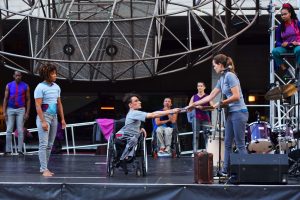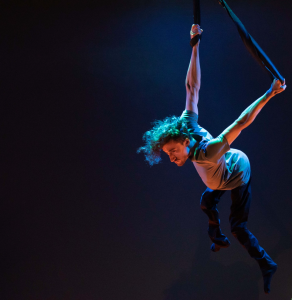At Diverse City, we believe wholeheartedly in Humane Employment. By that, we mean that work should not be something you have to endure. We want everyone we work with to feel supported to work to the best of their ability. No access requirement, caring responsibility or other personal need should be thought of as a problem, merely a consideration to be taken into account. If someone on our team has caring responsibilities, they might need to step away from their desk within a conventional 9am-5pm. Perhaps someone does their best work at night, or needs to work one hour at a time and then take rest breaks. Perhaps a colleague with dyslexia would feel more efficient if you communicate with them in voicenotes rather than emails.
Providing a humane work environment is not doing someone a favour – you have engaged them to do a job. It is in your best interests and theirs that they are supported to do the job the best they can. Sometimes we still get things wrong, but listening, learning, and creating an atmosphere where people feel confident to ask for what they need or tell you if something isn’t working means that we feel proud to call ourselves humane employers.
This, of course, has to extend out of the office. We work with a huge range of freelancers, artists, designers, performers, producers, and also partner with other organisations regularly. We have to include all of those people in this policy too – inclusion and support for all, means just that: for all!
We caught up with Jonny Leitch: drummer, composer, sound designer, aerialist, actor, and long time friend of the company to ask him for his perspective as someone employed by both Diverse City and Extraordinary Bodies on a variety of projects.
Meet Jonny
Interviewer: Welcome Jonny! Thank you so much for giving us some time today. To put you in context for someone who doesn’t know your work with us, I first wanted to ask you about what your experiences working with Extraordinary Bodies and Diverse City. Could you tell us a little about your history with the company and what kind of things you’ve worked on with us, please?
Jonny: I first worked with Extraordinary Bodies on the R&D for What Am I Worth in the National Theatre rehearsal space. It was still floaty; the project was still ephemeral. That was honestly a lovely experience. My background up to that point was music typically for contemporary band work and so I was trying to find where I might fit in creating a theatre or circus performance. It was my first R&D too, and being in this whole new world and trying to piece it together was strange. But because of the people in that room and how supportive and creative and open and everyone was, it wasn’t scary at all.
Now I think back to that, and I how I had assumed it would be all conforming to existing processes… but in reality there was a lot of room to be able to find my footing. Since then, of course, I worked on the What Am I Worth show, on tour. I’ve worked on Human. I’ve worked on a number of R&Ds for Extraordinary Bodies, and have more work lined up with you over the next couple of years too.

Interviewer: Do you feel like your association with our companies in particular then has shaped what you’re aiming at in terms of your ambitions? You were principally music-led to start off with, and now you are branching into performance of a different type. Do you think you would’ve done that anyway, or did working with us encourage you in that direction?
Jonny: I’ve always been someone that said yes and learned as I went. I always invest myself and go in weird directions and want to kind of go down the rabbit hole and see what’s down there. The first project I did for Diverse City, I was like, “What’s needed here is sound design.” So that’s what that role became. Diverse City really gave me the room and encouragement to try and shape roles for myself, which felt really reassuring. Every job I’ve done with them, I’ve done something different and they’ve been very accepting and encouraging. My first work with Extraordinary Bodies Young Artists was the first time I was doing more me-leading-a-project stuff, and that was unbelievably lovely to experience. And although there isn’t exactly a ladder in this industry, it lead to bigger things.
Interviewer: Yes, it’s not an obvious path – more opportunities can open up as you progress.
Jonny: Yes. Some stranger now says, “Oh, let’s do this project.” I’m like, “Ok – let’s go!”
Interviewer: Yes, it is a network-led industry as well, so the more you do, the more people think “That guy.”
Jonny: “That guy,” exactly. Working with Extraordinary Bodies and Diverse City has created that recognition of my work a lot, and expanded what skills I can offer.
Interviewer: Had you done aerial work before you were working with us?
Jonny: No. I say this story so much and I love it. [For my first job with the company] I was hired as a drummer. During the What Am I Worth R&D at the National Theatre, whilst everyone was talking over lunch, I mentioned, “Oh, as a kid, I used to do handstands to help me to get onto higher levelsif I’m on the floor and I’m not in my chair. I do a kind of handstand thing and throw my body up.”
Then Billy [Alwen, Co-Artistic Director, Extraordinary Bodies]’s ears pricked up and was like, “Show me. Can you still do it now?” We had like a little session of everyone showing skills that maybe other people don’t know. That was me going, “Oh, yes, I do movement stuff.” Then suddenly, from that one casual conversation, I had become an aerialist! It was purely Billy and Claire [Hodgson, Co-Artistic Director, Diverse City] being like, “What’s going on here? What opportunity could this be for you, and for us?”
My first contract said in black and white: I’m hired as a drummer. But the next one said, “You’re an aerialist now and you’re going to learn and be able do all this stuff.” That was amazing.
Interviewer: That’s an incredible moment – what a change for you!
Jonny: Yes, and there was no chance I would’ve believed after leaving uni that I would be flying through the air performing within a couple of years.

Working with Diverse City and Extraordinary Bodies
Interviewer: What is it like to be employed by us? Do you find that you are confident to ask for what you want when you are working with us, or what you might find helps you get to where you want to go with a project?
Jonny: Yes, I’d also add onto that, not only am I confident to ask, but… here is the thing that isn’t really talked about. In the wider industry, you’re kind of expected to know what your needs are, but lots of people don’t. You may know your living needs, but that knowledge is specific. How are you supposed to find out what will help you on a tour if you’ve never done one? I was never told before working with you guys how access audits work. Working with Extraordinary Bodies and Diverse City has been great for that practical knowledge: “Okay, this is how it works. Access to Work is a thing.” I was like, “Access to Work is a thing?”
They have been able to give me the support to find out what works best for me and they’re open to actually exploring those needs, and evolving them. The Human tour [2021-2022] was the first time I toured with a PA. The first time I had a PA in a room. I was like, “I know this is going to help, but how..?” The company were so open to it all – both suggesting stuff that had worked for other people, but also encouraging me to try different things to find what would work best for me personally.
Interviewer: It’s a really good point actually, particularly for young artists, because it’s one thing to be told, “Right, here’s a tick list of possible options; tick the ones that apply.” But if you’re engaging in a project that’s unlike something you’ve done before, it’s not necessarily reasonable to expect everyone to have a comprehensive understanding of what they will need before the project starts.
Jonny: Yes, it’s like my access audit now breaks up into categories of, “If you’re hiring me as an aerialist. If you’re hiring me as a drummer. For one day. For a week. A month.” so now people can just look at that document to be like, “Okay, so these are the things that apply” because I just didn’t know those things before!
I now know. Being on this tour I’ve found out more about how to ensure I can to do my best work. For example being able to get hold of a schedule of the day beforehand means that I can start the day and be mentally prepared. It just helps me not become overwhelmed. I didn’t know how much that would help me a couple of years ago, even though I knew what it felt like to be without it.
Interviewer: I think it’s quite a common experience. You’ve had to get on without the specific support that could have made it easier for you. Suddenly discovering that things could be easier must be a little bit discombobulating.
Jonny: It’s a whole thing for some neuro-divergent people. School was a great environment for me because the rigid scheduling just so happened to support the exact access I needed to be able to learn. There was a schedule I followed. There were transition periods where instead of you going from one thing, one project, one topic, one subject to another, immediately, you had to walk to the next one. It created all these techniques that I’m now using.
Interviewer: That’s fascinating.
Jonny: Now I’m able to look at that more objectively. In the past, I’d look at predictable routine and transition time, and think “Oh yes, this is useful.” Now I’m looking at it being like, “Actually, no, this is essential for me.” and have the confidence to say that aloud when we’re planning a show.
Working in the arts industry as a whole
Interviewer: Do you think your expectations of what you might expect from other employers have changed then through working with Diverse City? If you were therefore embarking on something new as someone you’d never worked for before, do you think you would now be more confident in what you could reasonably expect from someone?
Jonny: I’m going to be really honest here – that’s something that I’m still trying to work through. I’ve realised that so far, throughout my career, I’ve worked with a lot of ‘safe companies’ because I know they will support my needs. When I have got job offers from other inclusive companies, I have felt ok being brave in saying “I need this, this, this.”, and they’ve been happy to give it to me.
There are some other companies where it gets brutal. I can tell when I enter the room or even slightly beforehand. A lot of companies will openly say “We’re going to work you hard. We don’t care about tea breaks and things like that.” I’m actually working with Kate [McStraw, producer of Human] right now to try and create a better access document for myself because I want to go into those companies and feel more confident.
I’ve had a couple of job offers recently and I… well I had one job offer specifically recently and they said a bunch of stuff like, “Oh, we’ll put you in a B&B. We’ll give you this amount of budget per day to be able to do accommodation.” I looked at it and had to reply: “That budget is not going to get me anywhere as a disabled person. I have to stay somewhere that is accessible. Here are the details of some funding things that you guys would need to look into to help me work with you.”
They just stopped replying. But in one sense that’s great. It says a lot about that company. I’d rather know that that’s the culture than find myself under contract and really struggling.
Interviewer: Whenever we co-produce with other companies, one of the things we’re trying to encourage them to do going forward is to not think of access costs as budgetary frosting. “You’ll do your core budget and then we’ll do these bits if we’ve got money left over,” You have to include that right from the the starting point, right?
Jonny: If you’re going to work with a variety of people, and you want them to be able to do the best job that you’re requiring them to do, then that’s how you get there. You need to start with that and then work out from it. It’s unpicking hundreds of years of the brutal technical rehearsals and things like that, that you end up expecting people to do 16-hour days as standard.
But what if people began their planning by thinking “Actually, what if that person is feeding a baby? What if that person needs rest breaks throughout the day?” But the arts, of course, is an industry powered by people’s love of what they do, right? People work in the arts because they love working in the arts – and it’s competitive. It can create situations where people sacrifice their wellbeing for a chance to be a part of something because they’re afraid of being replaced.
Interviewer: It’s going to take a lot to shift the mindset that it’s not just a question of who can endure the most in order to get to the end.
Jonny: Right! Humane working isn’t just for the person that knows they’re disabled. It’s for everyone. The things that make working not just something that you can bear, but something that you can enjoy, make the whole creation of something a really positive process. Those things apply to everyone. Whether or not you have some type of neurodivergence or access requirement, whether or not you’re aware of it, there’s no one who doesn’t benefit from that. Everyone loves a tea break.
Interviewer: Yes. Also sometimes in those tea breaks, you end up having a conversation that sparks something that then is really helpful later. There’s just not anyone who doesn’t benefit from it. It seems like such an obvious thing, but it requires an industry-wide shift away from the kind of coalface mentality.
Are you optimistic about the future?
Interviewer: How optimistic are you about the way in which the arts is becoming more adaptive? Do you feel like strides are being made in the right direction across the field? Or do you feel like it’s still very specific to organisations like ours?
Jonny: Some of the work that you guys are doing is making efforts to affect other companies. You’re not just kind of doing your own thing and finding out these amazing practices and then going, “We’ll just keep it to ourselves.” I can see the bleed out – I can see it positively affecting other companies. You guys work with so many different artists, producers, everyone! And then those people are then going on to the next company, the next project and they’re coming into it with a different mindset. I really believe it’s going to make those changes over time.
Producers in particular can have a huge impact on access, I think. I wonder about what the next generation of upcoming producers are being taught. I hope it’s starting to be a more inclusive model – that young people at drama school or learning production on the job are learning that access has got to be right at the heart of everything for change to happen. If we also get the next generation of people with that mindset, starting off with that frame of mind, then we could see big things.
Interviewer: If you were encountering a young artist, perhaps with access needs, just beginning their career in the arts, what advice could you offer them?
Jonny: Just understanding your needs is so important – think broadly. Don’t exclude yourself from anything by thinking I could never have X support. You could even say to yourself “I can do this job, I could do this job easily if I have X.”
It’s also good to try to observe what doesn’t work for you. Have you noticed that every time after a job you burn out? Do your access needs change depending how much work you’ve got in a row? That’s a big thing that I’m learning about me! If it’s just a one-day job, my needs are totally different than they might be for a whole tour. This isn’t just about you being able to do that one day’s work. You need to see yourself as a whole, and that’s most important. Seek advice if you’re confused by anything, learning about access to work is essential but there are people out there that can help and support and guide how to get that. Also, access audits are wonderful because all of your needs are just in one place, in a document.
If you have a proper access audit, you don’t need to go through the faff that a lot of disabled people dread, which is every form that says, “Name your conditions,” It’s a terrifying moment because you know your conditions aren’t going to fit into that box.
Don’t be afraid to explore and be like, “I’m going to ask for this need this time and see how it pans out in those rooms,” because your day-to-day life is just so different compared to a workday.
Interviewer: That’s good advice though, to be observant about yourself because just because you’ve managed to get to the end of something, it doesn’t mean that you were necessarily well held during that process.
Jonny: The massive thing that Extraordinary Bodies and Diverse City, say to me… well, say to everyone is, “We just care about you producing your best. You at your best to produce your best.” If you’re someone that is afraid to say your needs because you feel you’re a burden, don’t forget that they are hiring you to do your job and if things are getting in your way, then you’re not doing your job at your best. It is benefiting everyone and in no way is an inconvenience because you want to produce your best work, they want you to produce your best work. If that means you having a break or having lunch already there when you go on lunch or ramps, et cetera. They just want an amazing show.
Interviewer: Yes. I think one of the things that I particularly feel is important in terms of the way it’s thought of is that this isn’t like some special, fluffy favour that’s being done for people! We’re hiring you because we think you’ll do the best job. We’re literally just all professionals trying to make an amazing show and that’s the way to think of it.
Jonny: Exactly: you need the company and the crew to be their best, which means they need to be in an environment that supports them.
Interviewer: I really appreciate your time, mate. Thank you so much.
Keep an eye out for Jonny in more upcoming projects to be announced later this year.





